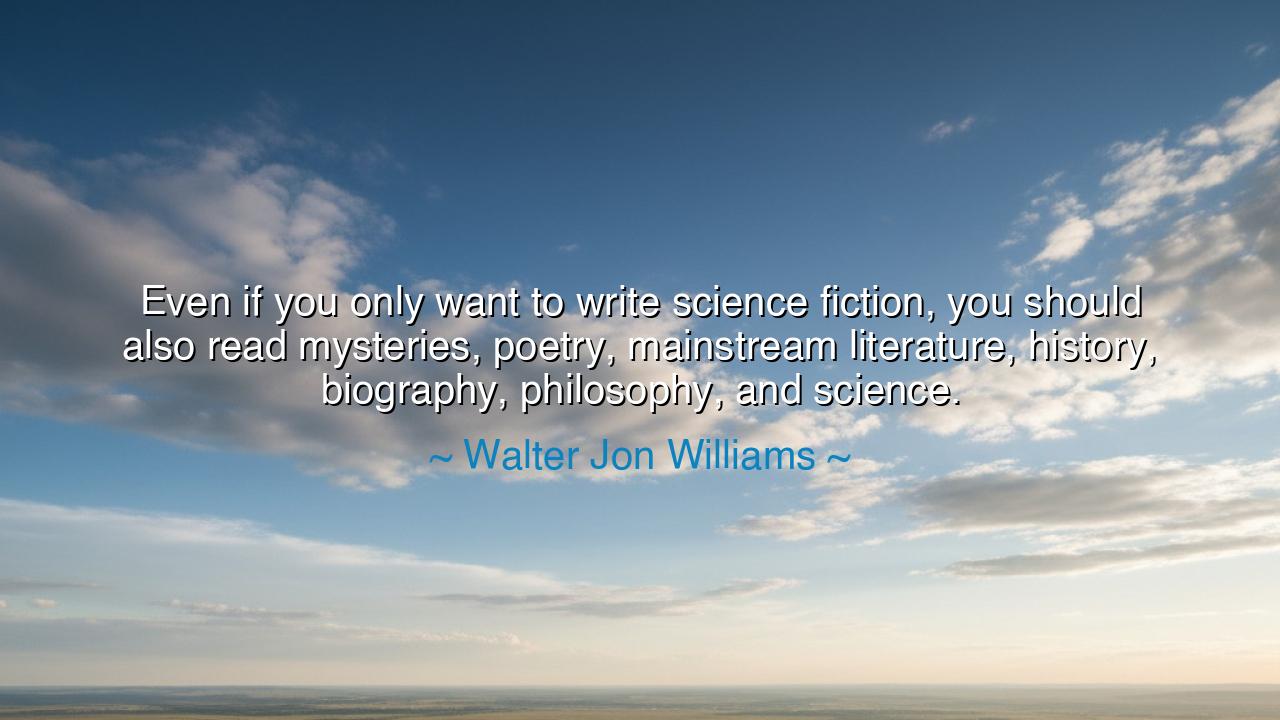
Even if you only want to write science fiction, you should also
Even if you only want to write science fiction, you should also read mysteries, poetry, mainstream literature, history, biography, philosophy, and science.






Hear, O seekers of knowledge, the command of Walter Jon Williams: “Even if you only want to write science fiction, you should also read mysteries, poetry, mainstream literature, history, biography, philosophy, and science.” These words are not only advice for the writer but counsel for every soul who would live deeply. For the mind that feeds only on one food will grow narrow and frail, but the mind that drinks from many wells will be vast, fertile, and strong. Williams speaks with the wisdom of the ancients: that the creator must be nourished by all streams, not just the one they wish to follow.
The origin of this teaching lies in the nature of story itself. No tale is born in isolation. Every poem, every novel, every myth carries within it the echoes of countless others. Science fiction may clothe itself in the garments of the future, but it is rooted in the mysteries of the present and the philosophies of the past. To imagine the unknown, one must first understand the known. To describe alien worlds, one must study the histories of earthly nations. To shape new civilizations, one must first walk among the wisdom of philosophy and the discoveries of science.
Consider the example of Mary Shelley, who as a young woman read widely in philosophy, science, and literature. Out of this feast of knowledge was born Frankenstein, the first great work of modern science fiction. Had she read only romances, her tale might have been slight; but because she knew of Galvani’s experiments with electricity, the myths of Prometheus, and the tragedies of the human soul, she created a story that has haunted centuries. Her greatness arose not from narrow focus but from wide vision.
So too with Isaac Asimov, whose genius did not come from science alone but from his voracious appetite for history, philosophy, and myth. His Foundation series echoes the fall of Rome and the philosophy of Gibbon’s Decline and Fall. His robotic laws were not merely clever inventions but reflections upon ethics, morality, and the struggles of mankind. He understood, as Williams proclaims, that to master one genre, one must study them all. The mystery sharpens suspense, the poem teaches the weight of words, the biography reveals the heart of human struggle, and philosophy provides the bones of thought.
The lesson for us, then, is clear: no art flourishes in isolation. The painter must study nature, history, and music; the musician must learn of mathematics and silence; the poet must listen to the voices of the people and the echoes of the past. The writer who reads only within their chosen field will starve; the writer who reads broadly will never be empty-handed when inspiration calls. Williams is urging us to become whole, to be shaped not by one narrow current, but by the great ocean of human knowledge.
In practice, take this charge upon yourself: if you write science fiction, also read poetry to learn rhythm and image. If you are a poet, read history, that your verses may echo truth. If you love mysteries, read philosophy, so your puzzles carry weight. Each week, choose a book outside your comfort, and let it shape your mind. Write notes, let metaphors cross-pollinate, and watch how your art deepens with every new perspective.
Thus the wisdom endures: greatness is not born of narrowness, but of breadth. The oak tree stands tall not because of one root but because of many. So too must you root yourself in science, in history, in poetry, in philosophy, if you wish your art to reach the heavens. Do not be content to sip from one stream; drink instead from all rivers, and your words will thunder like the confluence of mighty waters.






AAdministratorAdministrator
Welcome, honored guests. Please leave a comment, we will respond soon